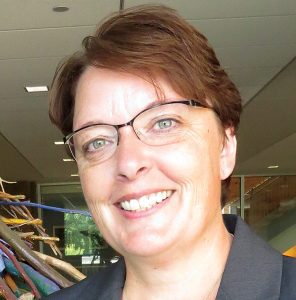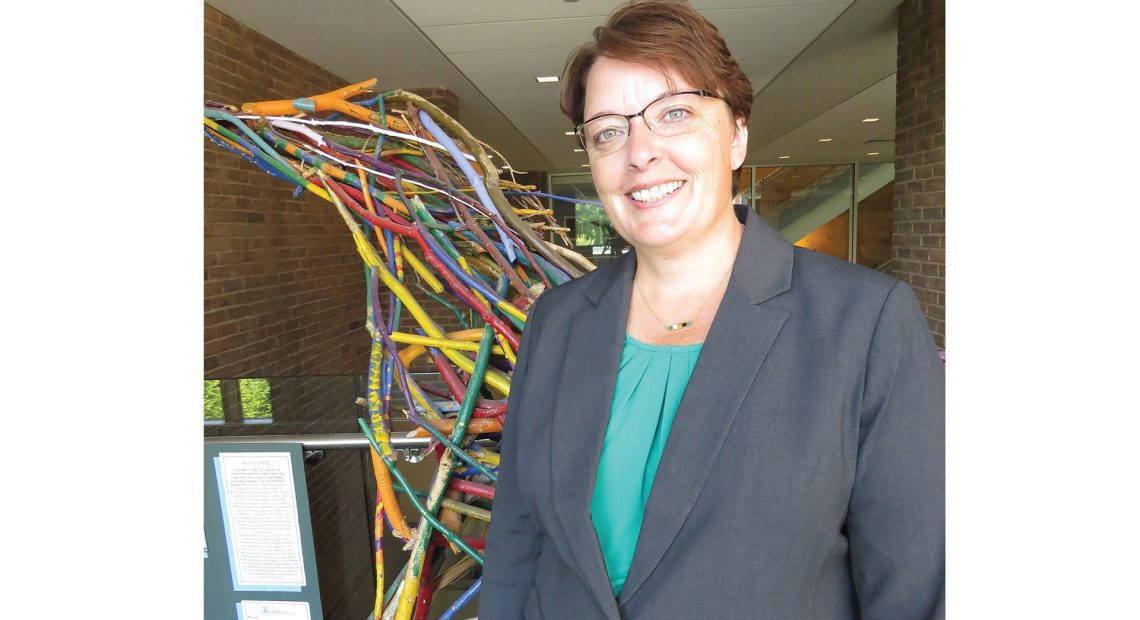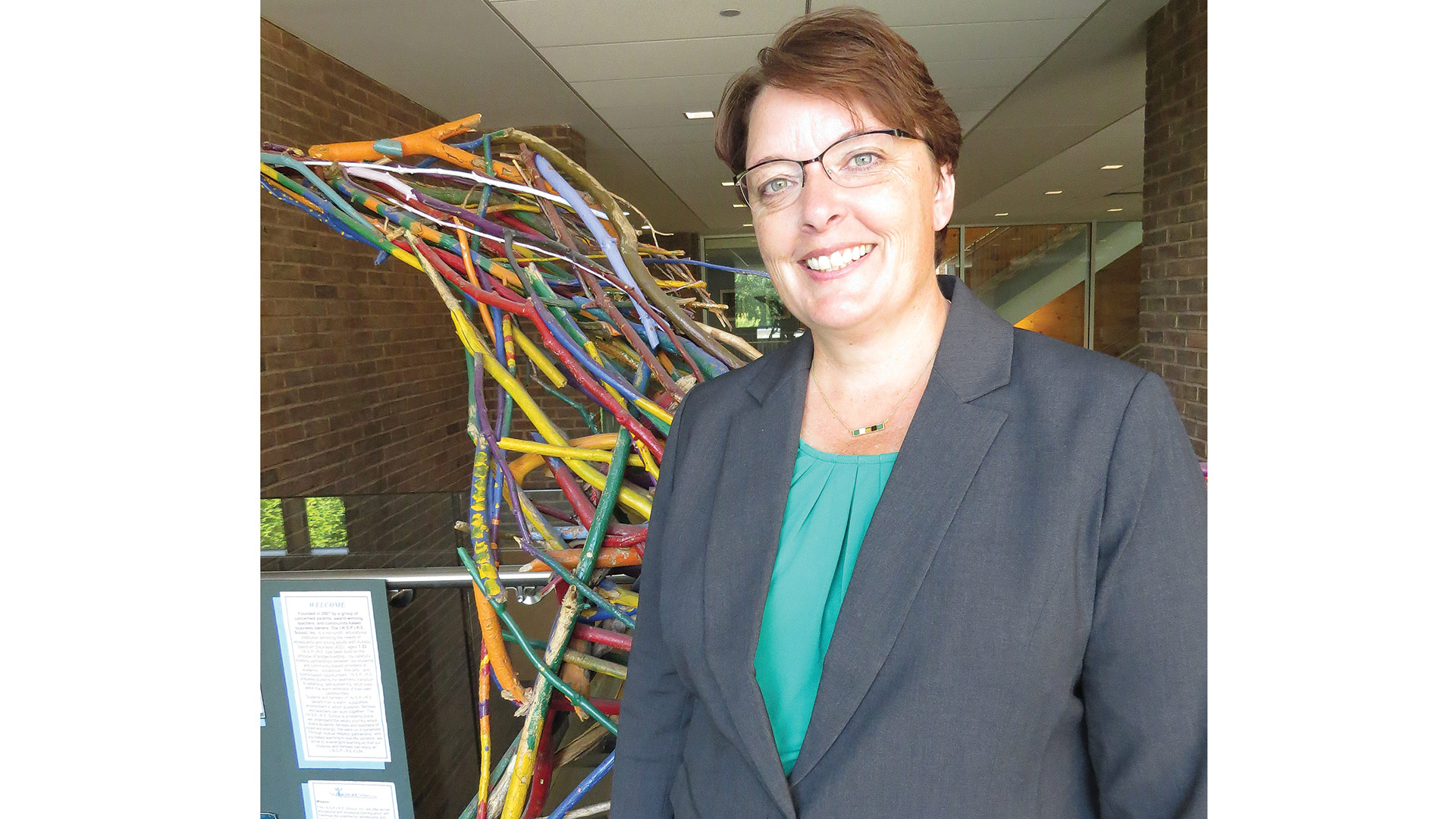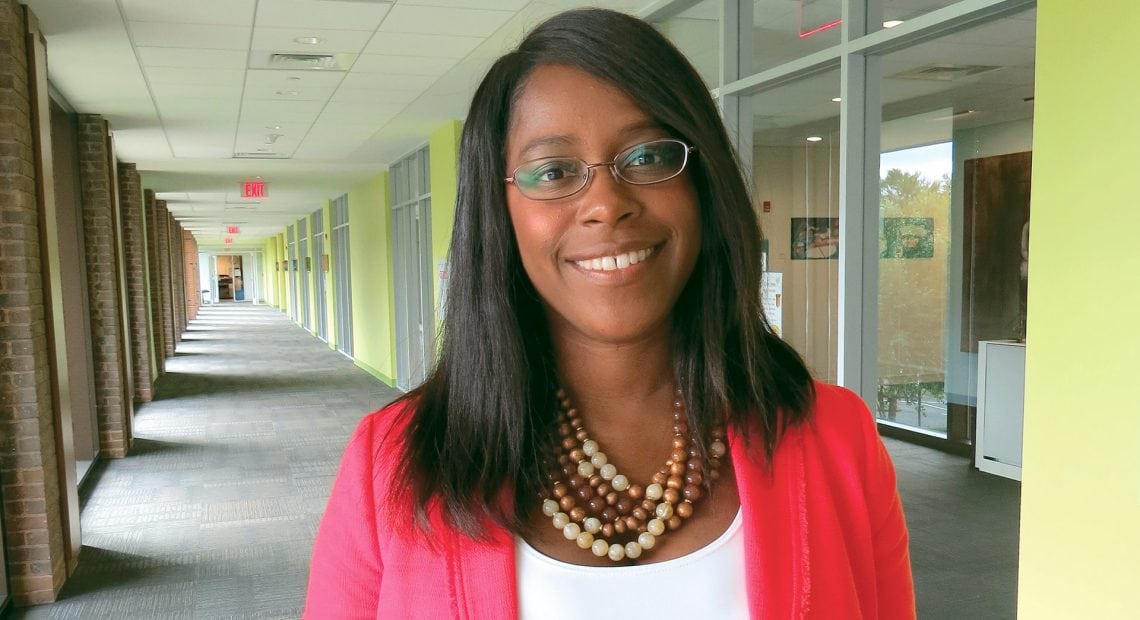Innovative Course of Action
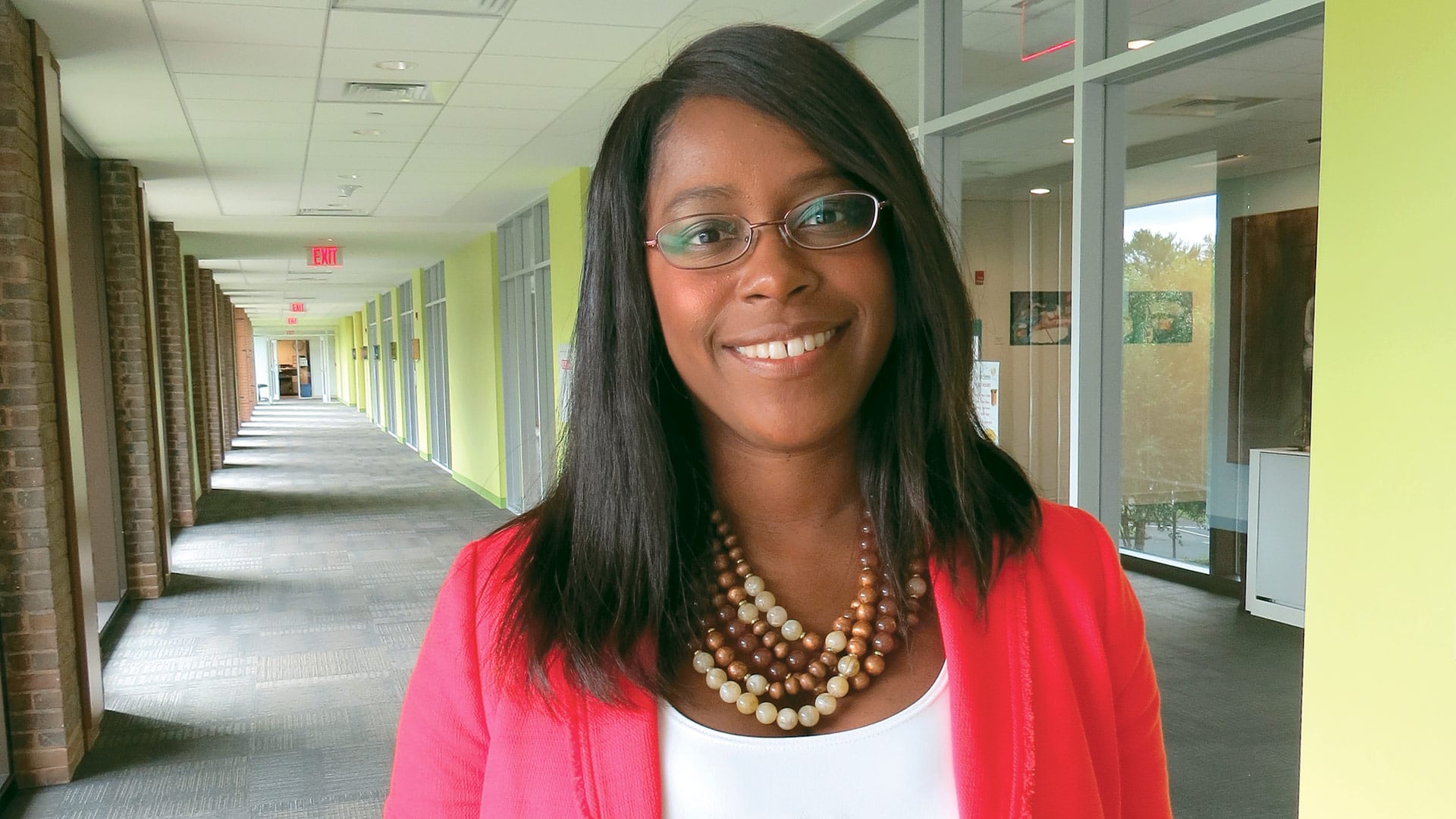
Yves Salomon-Fernandez
Yves Salomon-Fernandez became the 10th president of Greenfield Community College this past summer, succeeding Bob Pura at the helm of a school that enjoys some of the highest retention and graduation rates in the state. Her primary goals moving forward are to build on the momentum generated over the past several years, set the bar higher, and then clear that bar. Salomon-Fernandez is confident in her abilities, and, like the school itself, she says she’s “innovative and entrepreneurial.”
Yves Salomon-Fernandez remembers many things about her first interview as a candidate for the presidency at Greenfield Community College — especially the cold.
It was early April, and she recalls that morning being particularly cruel as she arrived at the Deerfield Inn for that interview session. It was so cold, and she appeared so uncomfortable, in fact, that Robbie Cohn, chair of the school’s board of trustees, felt inspired to give her his gloves, and for an attending student representative to give up her shawl.
“I was freezing, and as a measurement expert, I said to myself, ‘this is going to interfere with my performance if I’m distracted by the thought of being cold,’” she recalled. “With those gloves and that shawl, I thought I could give them a better glimpse of who I was and what I can do.”
Whether it was the additional layering or not, Salomon-Fernandez warmed up enough to sufficiently impress those interviewing her to become a finalist for the job. And, continuing in this vein, it would fair to say that the rest of the campus would soon warm to her.
Indeed, several weeks later, she would be named the school’s 10th president and the successor to long-time leader Bob Pura, who retired this past spring after 18 years at the helm.
When asked what she told those quizzing her, Salomon-Fernandez condensed it all down to a few words and phrases that would also set the tone for this interview with BusinessWest.
“I said I was very innovative, entrepreneurial, and like to think outside the box,” she recalled, adding that, in many respects, those traits are shared by the GCC community as a whole, which is another reason she was attracted to the school.
Entrepreneurial? Yes, entrepreneurial.
While some in her position would be hesitant to say out loud that a college is very much, if not exactly like, a business, she isn’t. Only, the phrase she uses is ‘academic enterprise.’
“Considering the challenges we’re facing in higher education, I think we really need to look at the model comprehensively and say, ‘how can we change this model to be sustainable over time?’” she said, adding that she’s looking forward to that specific assignment.
Salomon-Fernandez, 39, a native of Haiti who emigrated to the U.S. when she was 12, brings a diverse résumé to the Greenfield campus, including a stint as interim president of MassBay Community College, followed by her most recent assignment, president of Cumberland County College (CCC) in New Jersey.
Late last fall, it was announced that CCC would be merging with another institution in the Garden State and that her job would be eliminated.
Having already moved with her family several times over the past several years, she wasn’t looking forward to doing so again, but did so (although her husband and children will remain in New Jersey for a year) to keep her career on an upward trajectory — specifically in another college president’s position.
She told BusinessWest she was quite discriminating in her search for the right job opportunity. She applied for a few positions, but quickly set her sights on GCC, the only college in decidedly rural Franklin County.
“This is the one job I wanted — this is really a match made in heaven,” she said. Elaborating, she noted that, while she likes just about everything about the region — from Berkshire Brewing’s lagers to ziplining — she was really drawn in by GCC’s mission, important role in Franklin County, intriguing mix of programs, high transfer rate, and especially the art (much of it courtesy of students enrolled in the highly acclaimed program there) adorning walls, lobbies, and tables across campus.
“The values of GCC and the Pioneer Valley are very consistent with my own and my family’s,” she explained. “The commitment to renewable energy, sustainable agriculture, and rural living are all things I’m very passionate about and enjoy; this is a lifestyle that’s conducive to raising kids and a lifestyle that’s grounded.”
But fit also involves the size and nature of the challenge — in this case, a school that has been put on a solid foundation by Pura, but one that still has growth opportunities and challenges to be met.
“I’ve always been a risk taker,” said Salomon-Fernandez, summing up her mindset professionally, adding that, moving forward, her primary assignment is to continue and build upon the momentum generated in recent years under Pura’s stewardship. “GCC had the highest retention rates and the highest graduation rates in the state; that said to me that this is a very stable institution. I want to build on that.”
For this issue and its focus on education, BusinessWest talked at length with Salomon-Fernandez about her latest assignment in higher-education administration and how she intends to grow and diversify this unique ‘academic enterprise.’
Course of Action
As noted earlier, Salomon-Fernandez brings a diverse background, a host of skills, and many forms of experience to her new role.
For starters, she speaks four languages — English, French, Haitian Creole, and Spanish — and has consulted with the United Nations and the Bermuda Ministry of Education, taught as an adjunct professor for many years, held a number of research positions, and spoken and written on subjects ranging from women’s leadership to workforce development.
Her career in education began as a data analyst working on the No Child Left Behind project and continued on an upward trajectory to the college president’s office.
After serving as interim president at MassBay, in Wellesley, and then at Cumberland County College, she found herself looking for the proverbial next challenge. And in the parking lot of the Deerfield Inn, she was looking for a way to take the chill out of her fingers and toes.
She has another anecdote from her early visits to the GCC campus, one that speaks volumes about why she warmed to the campus so quickly and why she made this the focus of her job search.
She had been visiting the art gallery at the school the day before her interview, she recalled, and she was trying to remain ‘incognito,’ as she put it.
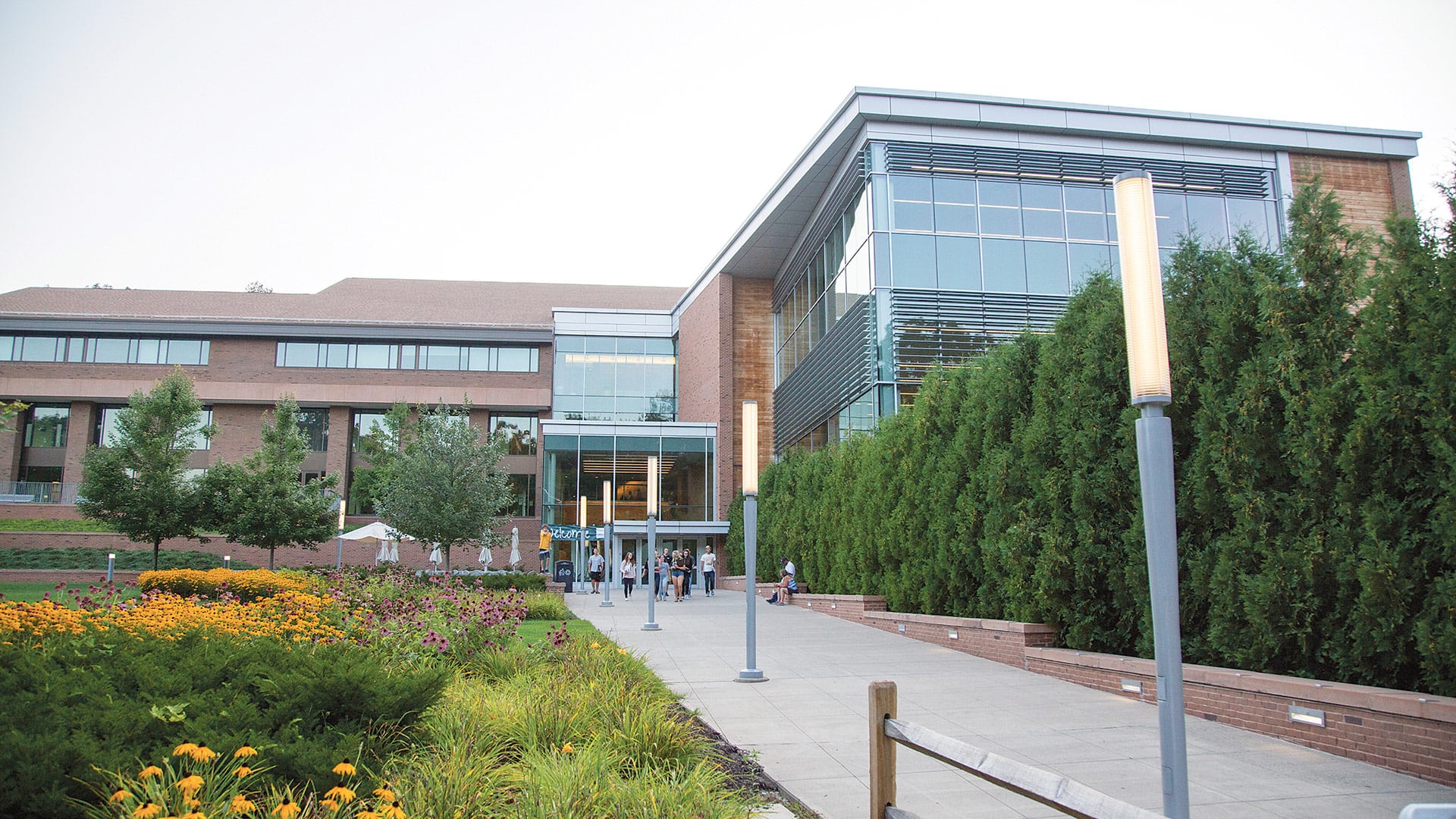
Yves Salomon-Fernandez says the GCC campus, as a whole, is innovative and entrepreneurial, and she shares those personality traits.
“I was looking around, and a member of the janitorial staff came up to me said, ‘if you like the artwork, I can show you some more — it’s throughout our entire building,’” she recalled. “My doctorate is in measurement — statistics, cycle metrics … that’s my field. I tell people I see the world as one big structural equation model, and that was the first evidence of the culture here. I’m aggregating different data points and different kinds of data, quantitative and qualitative, to get a picture in my mind of what this place is and what it might be like to work here.”
Finishing the story, she said the janitorial staff member asked a few questions and eventually commented that GCC was a nice place to work and that a few faculty positions and even the president’s position were open. She remained incognito through all of that, but came away even more convinced that this was where she wanted to land professionally.
“For me, I was looking for a place where I could get that kind of professional satisfaction and where the faculty, staff, and educators and engaged in local issues, regional issues, national issues, and international issues,” she went on. “It’s an intellectually vibrant college, and that was huge for me — people who are deeply engaged in their discipline and who care deeply about the human potential and the world in which we live. And also a place where discourse is valued; we may not always agree, but we agree to talk about things and to find a common ground.”
Salomon-Fernandez said that, in many ways, Cumberland N.J. and Greenfield, Mass. are very much alike. While much of the Garden State is urban and densely populated, Cumberland County isn’t. It’s also the poorest county in the state — just as Franklin County is in Massachusetts — and one battling issues ranging from a lack of high-speed Internet access to opioid addiction to job creation and providing individuals with the skills they need to succeed in a changing workplace. Again, just like Franklin County.
That’s another reason this challenge was attractive to her, adding that still another has been GCC’s response to those issues.
“What I really admire about GCC is that the college has been very innovative in terms of finding ways to meet students where they are and addressing their many challenges,” she said. “For example, in our library, we rent laptops to students and Internet routers to students; we lease bikes to students and even telescopes. There are many things the college does to make the school accessible and possible, and enhance student success.
“We were the first college in the country to have a food pantry,” she noted, referencing a facility where students, many of them non-traditional in nature, can not only get a snack but shop for their whole family. “There are a number of things the college has done under Bob Pura’s leadership that are cutting-edge and forward-thinking.”
Looking ahead, she wants to continue that pattern of innovation while carrying out a vital role as the only community college in the county.
Grade Expectations
Elaborating, she said that GCC, like all community colleges, has a diverse student population comprised of both traditional students right out of high school and non-traditional students who joined the workforce after high school and are now looking to enhance their skill sets to create new career opportunities.
That latter constituency (roughly 15% of the student population) is the fastest-growing segment at GCC, and Salomon-Fernandez sees ample opportunity for further growth in that realm.
“In a county like Franklin County, where the attendance rate for higher education is so low, we have the opportunity to make college and professional preparation and workforce training accessible to many more people,” she explained.
Elaborating, she said that one of her goals moving forward is to do even more outreach — the school already does a good deal of that — within the community to help it reach those who might think that college is beyond their reach or not for them.
“They may not understand that the mission of the community college is to help them in ways that a traditional college may not,” she explained. “So spreading the word and really doing outreach, working with our partners to get the word out, is a priority for us.”
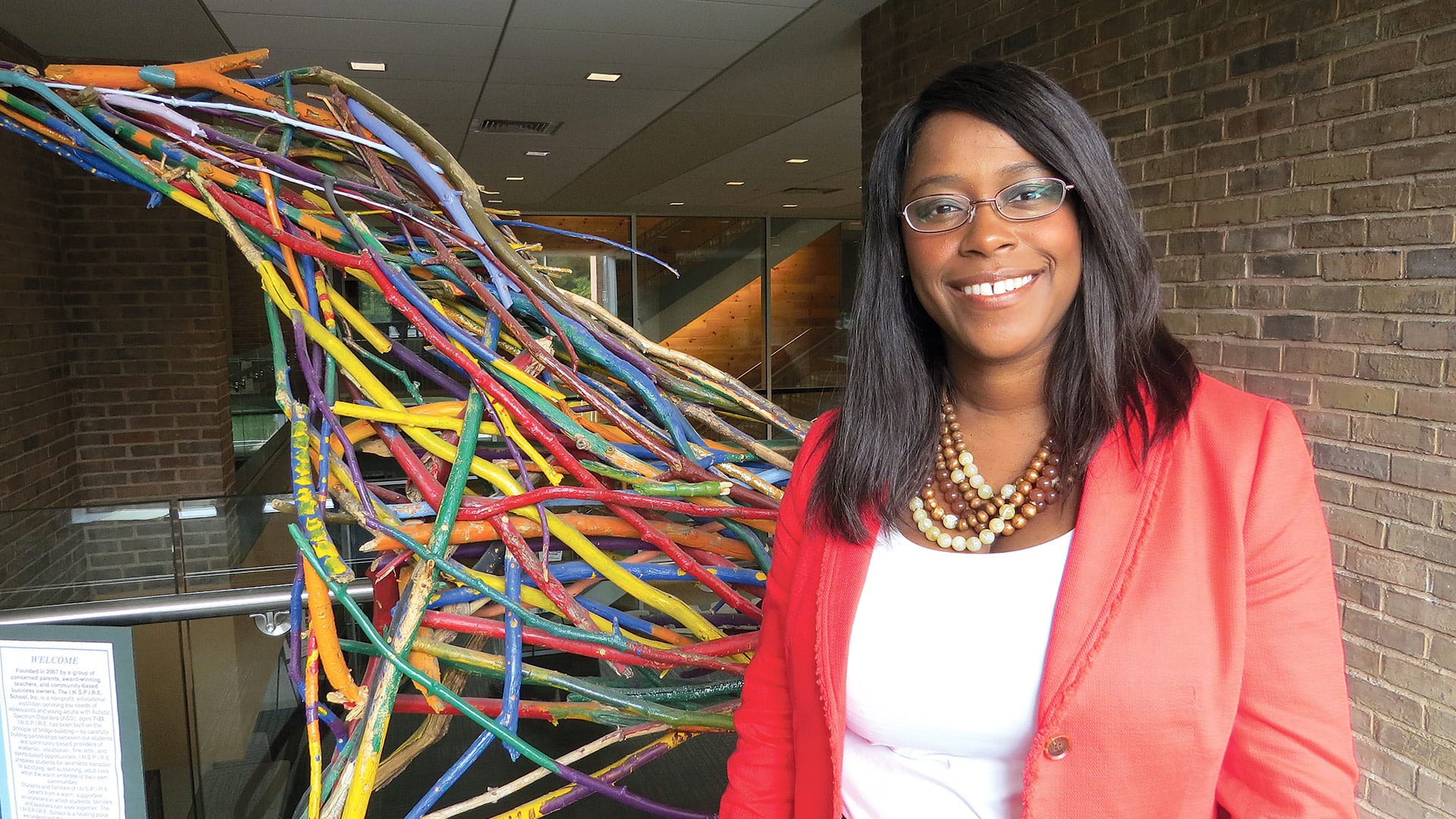
Yves Salomon-Fernandez says the enterprise model within higher education must evolve if it is to remain sustainable.
And getting people into higher education will be critical moving forward, she said, noting that the world of work is changing and the Bay State’s economy is truly knowledge-driven.
“We know that artificial intelligence, automation, computerization, all of those things are becoming more and more prominent,” she noted. “And that has implications for the careers for which we’re preparing students, and also for the pedagogies that we use. So we’ll be becoming much more interdisciplinary as a college, and there’s already a history of that here.”
Meanwhile, the enterprise model within higher education must evolve to remain sustainable, she went on.
“We have to look at whether this model is a financially sustainable model as it is,” Salomon-Fernandez told BusinessWest. “We have a number of contradictions; we hear people say the tenure model is antiquated, and at the same time, we have legions of adjuncts operating in the gig economy without health insurance, without benefits, and without pensions.
“And in some ways, as a higher education, all that is hypocritical, because we teach our students that people should be compensated fairly, and there’s some basic human rights and access to services that they should have,” she went on. “Yet, we struggle to provide that for the very people who are educating the current students.”
Overall, she notes, a school known for being entrepreneurial must be even more so in the years to come, given limited resources for the state and a growing role within the county.
“We have to look at what we can do to supplement those resources from the state because we know they are not sufficient to provide our students with the experiences we want them to have,” she said. “So what are some of the ways we can think entrepreneurially? What are some of the unmet needs within our college and within the market that we can help meet to create value, create revenue, and create experiences for our students?
“We have to think differently,” she said in conclusion. “We’re very committed to reinventing the academic enterprise model here at GCC, there is an appetite for it, and we want to do in a way that remains true to our values.”
Soar Subject
As she talked with BusinessWest on a Friday morning late last month, Salomon-Fernandez said that weekend ahead was packed with activity, including her first encounter with ziplining.
In recent weeks, she’s also had a behind-the-scenes look at Mike’s Maze, the famous cornfield attraction, gone swimming in the Connecticut River, and visited Brattleboro. She’s taking scuba lessons at UMass Amherst and is learning how to fly a drone.
In short, she’s settling into Franklin County and all that it has to offer. She’s also settling in GCC, which, like the country surrounding it, is a perfect match for her.
Like the school itself, in her estimation, she is innovative and entrepreneurial, talents that will be needed to build on the momentum that’s been generated over the past two decades and take the school to even greater heights.
George O’Brien can be reached at [email protected]



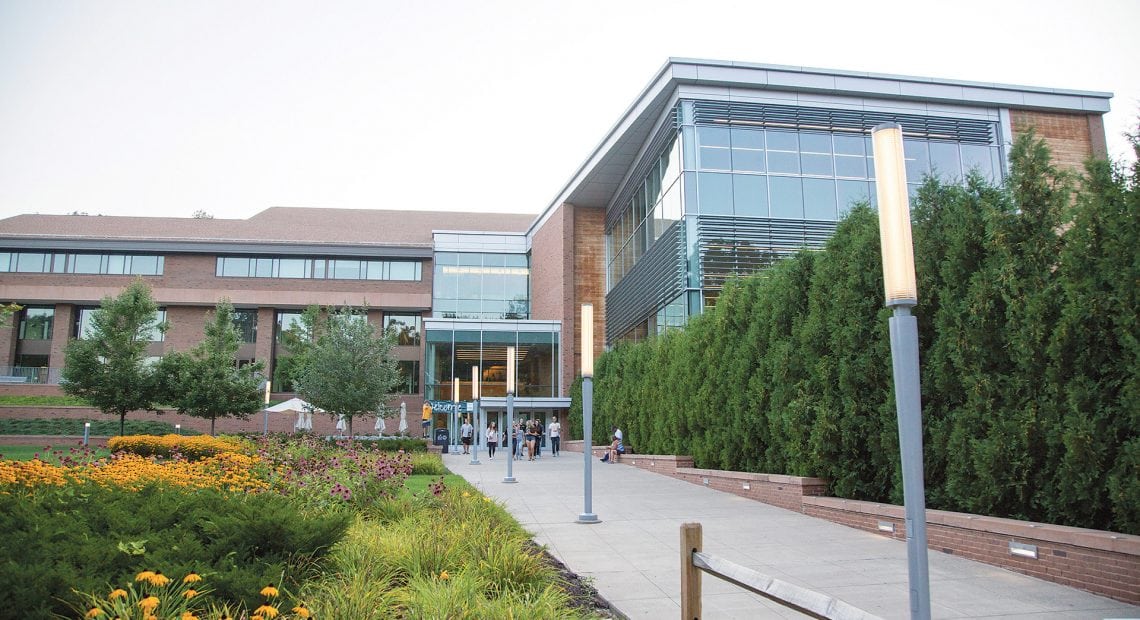




 We are excited to announce that BusinessWest has launched a new podcast series, BusinessTalk. Each episode will feature in-depth interviews and discussions with local industry leaders, providing thoughtful perspectives on the Western Massachuetts economy and the many business ventures that keep it running during these challenging times.
We are excited to announce that BusinessWest has launched a new podcast series, BusinessTalk. Each episode will feature in-depth interviews and discussions with local industry leaders, providing thoughtful perspectives on the Western Massachuetts economy and the many business ventures that keep it running during these challenging times.